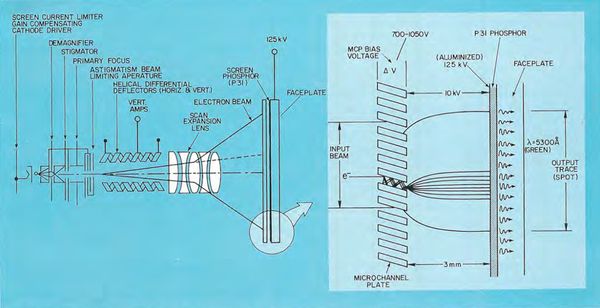T7100: Difference between revisions
m (link) |
(cat) |
||
| Line 28: | Line 28: | ||
==Links== | ==Links== | ||
* [http://www.vintagetek.org/wp-content/uploads/2011/10/7104-Springer-article-email-res.pdf Hans Springer: Breakthroughs throughout push scope to 1 GHz] | * [http://www.vintagetek.org/wp-content/uploads/2011/10/7104-Springer-article-email-res.pdf Hans Springer: Breakthroughs throughout push scope to 1 GHz] | ||
[[Category:Cathode ray tubes]] | |||
Revision as of 05:32, 30 October 2014
The Tektronix T7100 (P/N 154-0783-00 with P31 phosphor) is the CRT used in the 7104 and R7103 1 GHz analog scopes. It features a micro-channel plate electron beam amplification stage.
Compared to non-MCP high-speed tubes, the T7100 uses reduced beam current and acceleration voltage to achieve high deflection sensitivity, eliminating the need for high amplifier output voltages, thereby boosting amplifier bandwidth.
The electron beam pases through terminated helical deflection plates followed by a scan-expansion lens that increases deflection 4.5 times vertically and 4 times horizontally, before it hits the micro-channel plate which consists of parallel channels of 25 μm diameter and offset at a slight angle to the beam. The inside walls of these channels are coated with resistive material, with a voltage of 700-1050 V applied between back and front of the plate. Electrons entering a channel hit the wall where they initiate a cascade of secondary electron emission like in a photomultiplier.
A final 10 kV potential accelerates the beam across a 3 mm gap toward the phosphor coating.
The beam amplification is sufficient to view a single-shot event at 200 ps/Div with the naked eye.
Specifications
- Screen size: 8 × 10 Div. @ 8.5 mm
- Tube bandwidth: 2.6 GHz
- Resolution: 17 lines / Div.
- Deflection factor: 1 V/cm
